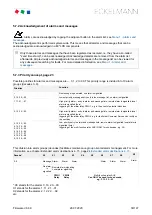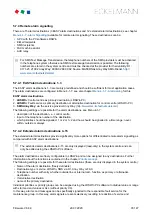
Firmware V6.6.9
29.07.2020
29/147
•
•
•
•
Priorities
Function
2, 12, 22,...92
High priority alarm - entry in alarm and message lists, remote alarm is signalled, local
alarm is signalled (horn),
triggering of the alarm relay PRIO2, e.g. for faults that Customer Service can rectify on
the next day
3, 13, 23,...93
4, 14, 34,…94
5, 15, 25,…95
6, 16, 26,…96
7, 17, 27,…97
8, 18, 28,...98
9, 19, 29,...99
Low priority entry in alarm and message lists, remote alarm is signalled, local alarm is
signalled (horn),
triggering of the multi-function relay AUX ONLY for one decade, e.g. X3
In addition to the two OFF-delay alarm relays
PRIO1
(1, 11, 21,...91) and
PRIO2
(2, 12, 22,...92), any alarm
priority can be assigned to the
multi-function relay AUX
(e,g. parameter
PrioX3
for 3, 13,..93 or
PrioX8
for 8,
18,..98). The AUX relay is set to
horn
at the factory and can be configured in the Menu 4-1-7 (under "Other").
For further information about the priority concept, see chapter
If the problem is rectified, the alarms in the alarm list can also be acknowledged there; for details, see chapter
Acknowledgement of alarms and messages
. The acknowledgement removes the alarms from the alarm list.
The entries in the message list cannot be acknowledged or deleted. For each newly entered alarm, the audible
signalling units (internal buzzer and optional external horn at the multi-function relay AUX) are activated; see
chapter
. The audible signalling units are switched off again by tapping the "Horn"
button in the main menu; see chapter
5.7.1 Explanation of terms for "Alarms and Messages"
The following terms are used in connection with alarms and messages in this operating manual:
receive time stamp ("incoming"): date with time of the alarm / message when this occurred (arrived).
pending alarm / message: alarm / message still present (pending), the cause (defect, error, event) has not
yet been rectified.
send time stamp ("outgoing"): date with time of the alarm / message when this was rectified (departed).
acknowledge: as well as the "receive time stamp", the alarm in the alarm list also has a "send time stamp"
and can be acknowledged; see chapter Acknowledgement of alarms and messages, page 22
Acknowledgement of alarms and messages
.
If the alarm signalling is carried out using a telephone dialling device using the provided OFF-delay
alarm contacts PRIO1/PRIO2, these must be subjected to cyclical monitoring to ensure that the
contacts also still signal in the event of power failure.
Risk of failure of the alarm paths or alarm forwarding!
In systems with highly disrupted CAN bus
communication (frequent messages of CAN faults or even CAN failures), it is not ensured that E*LDS
components can successfully forward their alarms. In order to ensure correct functioning of individual
alarm paths (e.g. via modem / relay contacts), these
must
be checked cyclically, for example by
triggering test alarms (Menu 4-1-7 - Other). It must be generally ensured that alarms are signalled via
multiple, independent alarm paths
.
Detailed information for the alarm and message texts of the system centre is provided in chapter
.
















































